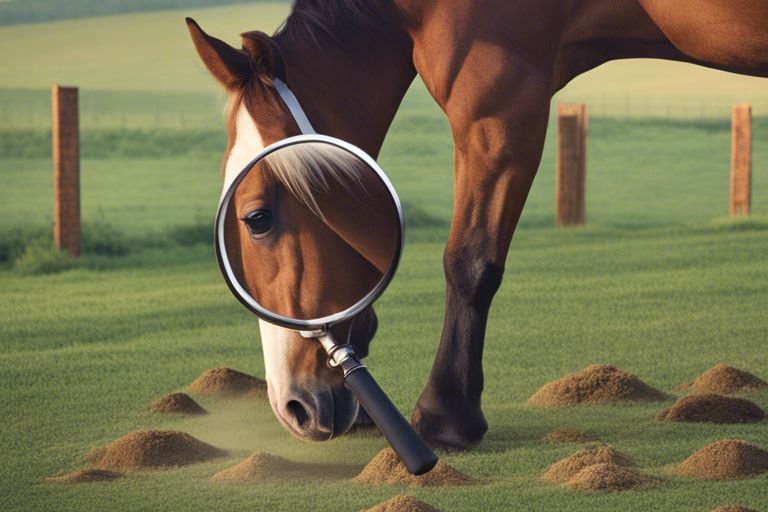You may have noticed your horse engaging in a rather curious behavior – eating poop. While this may seem strange to us, there are actually scientific reasons behind why horses eat their own feces. Understanding these reasons can provide insights into equine behavior and help us better care for our four-legged friends. Let’s probe into the fascinating world of equine behavior and explore the reasons why horses exhibit this behavior.
The Science Behind Coprophagy
Nutritional Benefits of Eating Feces
With a diet primarily consisting of fibrous plant material, horses have developed a unique survival strategy to maximize nutrient absorption by engaging in coprophagy, or the consumption of feces. By reingesting partially digested food, horses are able to extract additional nutrients such as proteins, vitamins, and microbial populations that aid in their overall health and performance.
Gut Health and Digestive Efficiency
Any discussion on coprophagy in horses cannot overlook the crucial role it plays in maintaining gut health and digestive efficiency. By consuming feces, horses are able to replenish necessary bacteria in their hindgut, promoting a balanced microbiome necessary for proper digestion and nutrient absorption. This behavior acts as a natural mechanism for horses to obtain beneficial microorganisms that aid in the breakdown of fibrous material and improve overall gut function.
Understanding the intricate relationship between coprophagy and equine physiology sheds light on the adaptive nature of horses in optimizing their diet and digestive processes. While initially perceived as a repulsive behavior, coprophagy serves as a vital component of a horse’s digestive strategy, offering valuable insights into their evolutionary mechanisms and nutritional requirements.
Psychological Aspects of Coprophagy
Behavioral Adaptation and Evolutionary Perspectives
If we look into the psychological aspects of coprophagy in horses, we must consider the behavioral adaptation and evolutionary perspectives of this intriguing behavior. Historically, horses evolved as herbivores in the wild, where they had limited access to nutrients. Consuming feces could have been a way to recycle crucial nutrients that were not fully digested the first time around, ensuring survival in times of scarcity.
Stress, Boredom, and Environmental Factors
Aspects such as stress, boredom, and environmental factors can also play a significant role in the development of coprophagy in horses.
- Stressful situations, such as being confined to a stall for extended periods or experiencing changes in their routine, can trigger coping mechanisms like coprophagy.
This behavior can also be a result of boredom, especially if the horse lacks mental stimulation or social interaction. Environmental factors, such as inadequate forage quality or lack of access to pasture, can further contribute to the development of coprophagy in horses.
Coprophagy in Different Life Stages
Foals Learning from Adult Horses
Life for foals involves a period of observing and learning from adult horses within their herd. Coprophagy, or the consumption of feces, is a behavior that young foals often mimic after observing older horses engage in this activity. While this behavior may seem unappealing to humans, it serves a purpose in a horse’s natural environment.
Age-Related Changes in Coprophagic Behavior
Different stages of a horse’s life can influence their coprophagic behavior. Young foals may engage in coprophagy more frequently than adult horses, as they are still learning about their environment and the habits of their herd. As horses mature, their coprophagic behavior tends to decrease, reflecting a shift in their dietary and behavioral needs.
Coprophagic behavior in horses can vary depending on their age and stage of development. While foals may initially engage in this behavior as a form of learning and exploration, adult horses typically display less coprophagy as they establish their diet and social behaviors within the herd.
Management and Prevention Strategies
Many horse owners are concerned about their horse’s coprophagy, or manure-eating habits. To address this behavior, it’s important to understand the underlying reasons why horses engage in this behavior. For detailed information on Coprophagy in Horses, you can refer to this resource.
Dietary Adjustments and Supplements
An effective way to address coprophagy in horses is by making dietary adjustments and incorporating specific supplements into their feed. For some horses, a lack of certain nutrients may drive them to consume manure. Consult with your veterinarian or equine nutritionist to ensure your horse’s diet is well-balanced and meets all their nutritional requirements.
Environmental Enrichment and Behavioral Training
Strategies to prevent coprophagy in horses can also include environmental enrichment and behavioral training. Providing ample turnout time, engaging toys, and social interaction can help reduce stress and boredom, which are common triggers for this behavior. Additionally, implementing positive reinforcement training techniques can redirect your horse’s focus and discourage them from eating manure.
Conclusion
Hence, through the scientific explanations provided above, it is clear that horses engage in coprophagy for various reasons, ranging from nutritional deficiencies to the importance of bacterial fermentation in their gut. Understanding these behaviors can help horse owners and caretakers ensure the well-being and health of their equine companions by addressing any underlying issues that may lead to such behavior. By providing a balanced diet, proper forage, and ensuring a stress-free environment, horse owners can help minimize the occurrence of coprophagy in their beloved horses.
